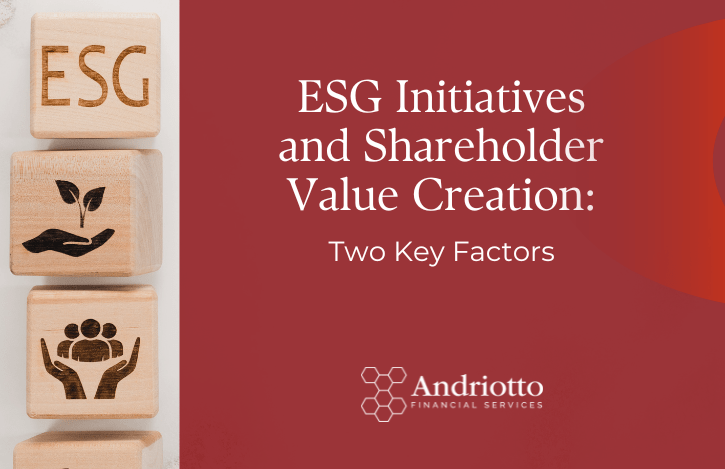A significant critique of corporate sustainability has historically been its perceived prioritization over shareholders’ interests. This prioritisation potentially conflicts with managers’ fiduciary duty. However, in 2016, Professors Aaron Yoon, George Serafeim, and Mozaffar Khan published the paper “Corporate Sustainability: First Evidence on Materiality” that began to challenge this notion. The research demonstrated that considering financially material ESG factors (those linked to a firm’s core sector practices) boosts portfolio returns. This alignment supports the idea that such ESG initiatives and sustainability efforts contribute to creating shareholder value.
The paper’s impact was notable, with some attributing its publication to the rise of ESG investing. The Financial Times acknowledged it as a turning point on how investors perceive and integrate ESG information. Despite its traction among investors and managers, sustainability remains a divisive topic. Academic consensus on its impact on shareholder value remains elusive, and ESG investing has become entangled in political discourse. Some conservative critics dismiss it as a guise for advancing a liberal agenda. On the other hand, liberal critics argue it falls short in addressing global challenges adequately. A survey of over 100 large U.S. companies revealed that nearly half have faced ESG backlash. Additionally, 61% of these companies expect this resistance to persist or escalate in the coming years.
Nevertheless, ESG investing persists, with nearly all companies claiming some form of engagement in ESG practices. Consequently, comprehending the tie between ESG efforts and shareholder value remains paramount. Below, two illustrative examples of the link between ESG and shareholder value creation are presented.
The crucial role of capable managers in deciding on ESG initiatives
The calibre of management can influence whether ESG initiatives contribute to shareholder value. In a research project, Professors Kyle Welch and Aaron Yoon examined the stock returns of U.S. firms from 2012 to 2020. Results showed that skilful managers allocate resources to ESG endeavours in a manner that enhances shareholder value.
We identified proficient managers using Glassdoor employee ratings of senior executives. Results show that companies led by high-ability CEOs, coupled with ESG investments, outperform those led by low-ability CEOs with similar investments. The outperformance amounts to 6.64% annually. Furthermore, companies with high-ability CEOs and ESG investments outperformed those with just high ESG investments but low managerial proficiency. Similarly, they outperformed firms with low ESG investments but high managerial capability.
These results underscore the necessity of both competent leadership and substantial ESG investment to optimize shareholder value. This correlation is logical. Under pressure to engage in ESG initiatives, CEOs are likely to prioritise projects that yield shareholder value. This is due to their compensation’s tie to stock performance.
The crucial role of supply chain ESG initiatives
In 2023, Professor Aaron Yoon teamed up with other researchers to examine the long-term value implications of supply chain ESG. They also examined the usefulness of this information to investors.
Although a well-known concept, supply chain risk has been difficult to quantify, mainly due to two important hurdles. Firstly, Suppliers’ identities are often hidden. Secondly, there is a lack of a credible measure of supplier ESG practices, especially when suppliers are private. The researchers developed a metric to address this issue.
Their study focused on U.S.-listed companies and their supply chains. It covered private and public suppliers located in the U.S. and abroad from 2009 to 2020. They collected information on companies’ suppliers and data on negative ESG news events. These events within a firm’s supplier network were used as a proxy indicator of the firm’s supply chain ESG risk.
They identified a correlation between the ESG risk in a company’s supply chain and its future stock returns. Specifically, the portfolio of firms experiencing the fewest supplier ESG incidents showed an annual excess return of 6.77%. This was in comparison to those with the highest number of incidents.
These observed returns primarily stemmed from three factors. Firstly, enhanced supply chain stability resulted in fewer disruptions and shocks. This stability enabled companies to meet customer demands, optimise inventory management, and operate with greater efficiency. Secondly, responsible sourcing practices attracted socially conscious consumers and investors. This shielded companies from supply chain issues that could stain their brand reputation. Lastly, ethical sourcing served as a hedge against regulatory risks and reduced legal liabilities.
Why should ESG initiatives be tied to shareholder value?
Why should ESG initiatives be tied to shareholder value? Because put simply they use the resources of the firm and, hence, represent investment activities. Investors therefore need to diligently uncover the connection between firm ESG efforts and shareholder value to make informed investment decisions.
Looking ahead
Several key issues are expected to shape the ESG discourse in the coming years. These include the disclosure of ESG information, its processing by data vendors, its utilisation by investors, and regulatory oversight.
Looking ahead, there is significant potential in the investment and accounting sectors for enhanced disclosure and transparency. For companies and their management, prioritising ESG investment is crucial. Moreover, quantifying its contribution to shareholder value is likely to attract perceptive investors seeking potential returns.
At AFS, we are passionate about fostering innovation and empowering ambitious minds to flourish. Our mission is to provide best-in-class financial services for traditional and crypto deals, exploit European grants, and use quantitative methods to improve clients’ performance. We aim to help our customers unlock their full business potential.
Let’s unlock your enterprise’s full potential together!
Get in touch at [email protected].


